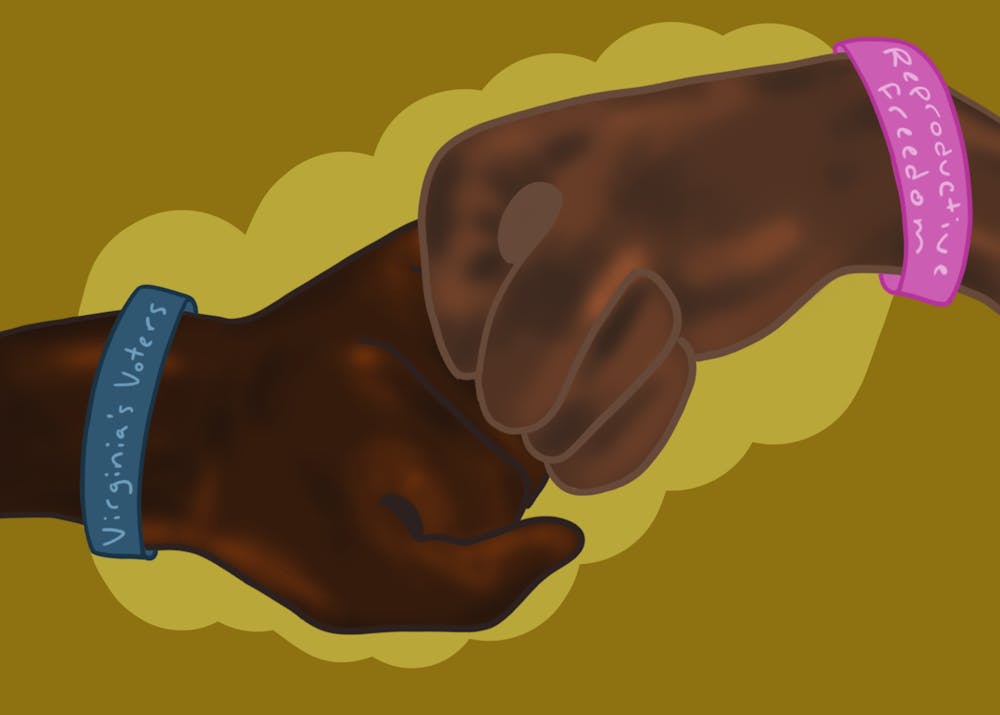Virginia remains an island amid treacherous seas — the only Southern state to not patently restrict access to abortion after the Supreme Court overturned Roe v. Wade. Our neighbor to the South, North Carolina has blocked abortion access after 12 weeks’ gestation. Our neighbors to the west, Tennessee, West Virginia and Kentucky have all passed total bans to abortion at any stage of pregnancy. These states only encompass a fraction of all national abortion bans — it is estimated that 2 in 5 women in the United States now live in a state that restricts or bans their access to reproductive healthcare. Since Virginia inhabits a unique role as the only state in the Appalachian region to not restrict or ban abortion access, it is imperative that our legislators take action to enshrine and protect abortion rights — not only for the good of Virginians, but also for residents of states surrounding us.
Virginia, despite having not yet banned abortion, has not been exempt from the toxic trends of pro-life movements. Closest to the heart of Virginia’s pro-life movement has been the push for a 15-week, “common sense” abortion ban. Virginia Gov. Glenn Youngkin argued that the moment the fetus feels pain — which, according to various studies, is actually somewhere between 24 and 25 weeks, if not later — abortion must be limited. Not only is this argument about gestational development misleading scientifically, the reality is that over 90 percent of abortions happen before that point. Moreover, such harsh restrictions on abortion are proven to take away more lives than they would theoretically protect. In this way, Virginia, like other states, has experienced the misleading and dangerous claims of the pro-life movement at the highest echelons of state power.
But unlike in other states, the problematic perspectives of powerful people do not seem to be indicative of a larger, more organized ground swell against abortion. Rather, in 2023, Virginians voted for a Democratic majority. Political analysts viewed last year’s election as a referendum on abortion, and the Democratic majority suggests a pro-choice preference in a majority of Virginia’s voters. Even more potently, polls suggest that almost three-fourths of Virginia would either like to keep the current 26-week restrictions or lessen restrictions even further.
State legislators have appreciated this overwhelming support for reproductive freedom and have passed important bills to this effect, bills which protect both Virginians and neighboring state residents. These bills include protections against the extradition of people over abortion procedures and protections for private menstrual health data. The latter bill, especially, is absolutely integral to guaranteeing broader abortion rights for the South. Recently, Democratic legislators have also been successful in their efforts to reject radical bans on abortion access which claim to protect women and unborn children but actually just further endanger the most vulnerable in our community. These efforts are all sincerely commendable and are a constant reminder that we cannot forget the daily work that goes into protecting abortion rights.
Despite such clear and laudable actions, however, the most central part of the Virginian reproductive freedom agenda — a state constitutional amendment — has not yet materialized. In fact, this process has only been further delayed. If everything breaks right, an amendment may hit the ballot boxes as early as late 2026. The process of passing a constitutional amendment to a state constitution is often paired with multiple years of legislative difficulty as legislators hammer out the specifics of the language. Regardless of such intricacies, this amendment must remain an unambiguous legislative priority because such an amendment is integral for reproductive freedom in Virginia and other Southern states.
It is abundantly clear that Virginian voters do not agree with Youngkin’s pro-life stance, and they have shown that powerfully at the ballot box. It is our vote against such forces that has, to this point, secured reproductive healthcare in Virginia and beyond. Virginia now sets the example for reproductive healthcare access across the South. Even more than that, our legislature has a duty to protect reproductive freedom for both Virginians and our neighbors. Just last year, there was a 75 percent increase in the number of abortions safely accessed by women in Virginia, a statistic which is undergirded by bans in other states. Simply put, Virginia is — and must continue to be — a safe haven for women in the South who are seeking reproductive healthcare.
Because the stakes here are so high — impacting not only us, but all women in Southern states — we as Virginia’s voters need to take seriously the weight of our vote. We must keep an eye on the local and federal candidates campaigning to represent you. Consider what they say, and watch if it matches what they do. Even more importantly, Virginians should examine the ways in which we can get involved on a local level, whether it be through a phone bank, a donation, an on-Grounds CIO or even a conversation with someone who disagrees. When Virginians vote for reproductive freedom, when Charlottesville citizens rally for abortion rights outside of their courthouse, when donors raise money for the Blue Ridge Abortion Fund, the activism done is not all just for the benefit of citizens in the Commonwealth. This goes beyond us. Rather, we rally for the women who have nowhere left to turn in their own states, and we vote for the policies and freedoms that we can only hope set a permanent example of choosing freedom for ourselves over infringement by others.
Scarlett Sullivan is a senior associate opinion editor who writes about politics for The Cavalier Daily. She can be reached at opinion@cavalierdaily.com.
The opinions expressed in this column are not necessarily those of The Cavalier Daily. Columns represent the views of the authors alone.







